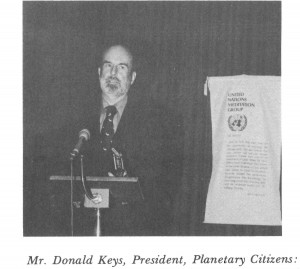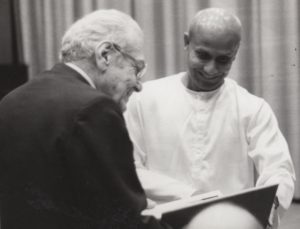Cyprus, Ambassador Rossides Honoured 9 Jan 1979
Filed under z- no categoryTEXT below from cut and paste of ocr doc, to be cleaned up and edited, Check images for original in gallery below)
 Our honoured guest, Ambassador Rossides, Sri Chinmoy and friends. If one were to ask what is the greatest privilege in life, I would say the greatest privilege of life is to be associated with people of nobility-nobility of the spirit, nobility of the heart. And where does one find people of nobility? One finds many of them at the United Nations. And in whom are these characteristics more resident than in Zenon Rossides, whom it has been my pleasure to know as colleague and friend for a number of years? For me, Ambassador Rossides summarizes the qualities and characteristics of his country, a country which is a gateway and bridge not only for kings and conquerors, but for the world’s greatest philosophers and teachers. It was early a Christian nation, and is strongly holding to its faith. It is a courageous nation, a nation schooled and grounded in belief in ethics and moral values. It is so fitting that Ambassador Rossides should have been these many years the Representative of that country, for he was one of its greatest patriots in its fight for freedom, a fight which continues, unfortunately, even in this late day. Ambassador Rossides has stood as a rock within the United Nations for the values which he per-sonally embodies. In company with other nations, his has been a small delegation, and there have been many times when he has made a great personal expense of energy and commitment. He has gone from committee to committee during a General Assembly for months on end in order to be present to make the telling point for human righteousness. Whether it’s in the Sixth Committee, or in the First Committee, or in the Third Committee, or in the Special Political Committee, or in the General Assembly, Zenon Rossides has been there.
Our honoured guest, Ambassador Rossides, Sri Chinmoy and friends. If one were to ask what is the greatest privilege in life, I would say the greatest privilege of life is to be associated with people of nobility-nobility of the spirit, nobility of the heart. And where does one find people of nobility? One finds many of them at the United Nations. And in whom are these characteristics more resident than in Zenon Rossides, whom it has been my pleasure to know as colleague and friend for a number of years? For me, Ambassador Rossides summarizes the qualities and characteristics of his country, a country which is a gateway and bridge not only for kings and conquerors, but for the world’s greatest philosophers and teachers. It was early a Christian nation, and is strongly holding to its faith. It is a courageous nation, a nation schooled and grounded in belief in ethics and moral values. It is so fitting that Ambassador Rossides should have been these many years the Representative of that country, for he was one of its greatest patriots in its fight for freedom, a fight which continues, unfortunately, even in this late day. Ambassador Rossides has stood as a rock within the United Nations for the values which he per-sonally embodies. In company with other nations, his has been a small delegation, and there have been many times when he has made a great personal expense of energy and commitment. He has gone from committee to committee during a General Assembly for months on end in order to be present to make the telling point for human righteousness. Whether it’s in the Sixth Committee, or in the First Committee, or in the Third Committee, or in the Special Political Committee, or in the General Assembly, Zenon Rossides has been there.Sri Chinmoy-our in-spiration, our director; my friend Donald Keys and my colleagues and dear friends, I thank you all for all the kind things you have said about me. They are a bit exaggerated, but still I am moved by your feelings. I feel that I have done nothing more than what was my essential duty-duty to myself, duty to my country, duty to the whole world. I felt only pleasure in what was a comfort for me to do. I was moved to do what I did by a power outside myself. I did not think everything out; it came naturally to me. It should be so, because all things in this world are interdependent and one cannot help Cyprus ualess one helps the whole world. And the whole world suffers when Cyprus or any party suffers. That is why the United Nations, as a global organization, is the only hope of mankind in our time. I have been involved with the United Nations for many years, first as Observer, and then as Permanent Representative, taking a more active part. But I can say that nothing but the United Nations can save the world in its growing predica-ment. As we notice, there are growing manifesta-tions of insecurity in the world. The United Nations has been working hard to meet the situations, and has been successful in many respects, particularly in all the efforts In the periphery. It has been wonderful how it has succeeded. All the Secretaries-General have worked hard. I want to praise particularly our present Secretary-General, who is very active and energetic. His whole life is devoted to promoting the United Nations, having it consider every problem as far as possible and doing everything he can to get the United Nations central in world affairs. We can see from the introductions to his reports of the last two years that he is cen tering upon the need for the United Nations. You need the axis upon which the world developments turn. Unfortunately, on matters of interna tional security and peace the United Nations has not been able to achieve what was expected and envisaged for it in the Charter, for reasons which we cannot enter into now. But we do hope that the ideal will be reached eventually and will be realized . Unless the United N ations is a b le to maintain international peace-other than through armaments-the future of humanity cannot but be very grim . I have hope, however, and I believe that things will develop in such a way, through the influence of the universal spirit , fo r the good a n d not for the evil of mankind. I believe that the term my friend mentioned, “the moral flow of the universe,” will prevail and we will h ave in reality a n effective Un ited Nations. In the p ast, men used to be d ivided between the idealists and the materialists. The idealists were thought to be dreamers, thinking and d reaming of things that were not pra ctically attainable. And the materialists were supposed to be the p r actical people who realized what could and could not b e done. But they did not realize that the spirit of man contains the material realities, that the potentialities of the mind are infinite. The mind and spirit of m a n can create so that what appears impossible tod ay, tomorrow is not only possib le but necessary. So we h ave reached a tim e in history when the d ivision between the mater ialists and the idealists is blurred and has no meaning. Practicality and ideology are one and the same . Nuclear weapons have come to say that unless you follow the proper line, the moral flow of the universe, unless you do the right thing, you are doomed physically -not idealistically but physically. So the idealist becomes the really practical man because he sees what is good for mankind and he follows that line for the survival of humanity, the physical survival of humanity. It is not a question of how the ideal survives or whether a person will go to Heaven or not go to Heaven. But it is the continuance of human life on this globe that is the problem. It seems to me that in our times the “high ethical road” is more practical than the “low practical road.” The two blur together. If you want to be practical, you have to follow the high ethical road.
 This brings me to the importance of this Meditation Group. We have reached a point in history when the United Nations, in order to be able to achieve its purposes under the Charter and bring to humanity real salvation from dangers that are now certain-will have to turn to the spirit. The spirit must enter into every action that is taken in the United Nations because the spirit is that part of the human being that can never go wrong.
This brings me to the importance of this Meditation Group. We have reached a point in history when the United Nations, in order to be able to achieve its purposes under the Charter and bring to humanity real salvation from dangers that are now certain-will have to turn to the spirit. The spirit must enter into every action that is taken in the United Nations because the spirit is that part of the human being that can never go wrong.The intellect is more often than not influenced by selfish pursuits of power, domination and every-thing else. But the spirit is the link between man and the universal mind. The spirit derives its thoughts and its power from that mind. In whichever individual that spirit is expressed, it is one and the same. Through ·the spirit, then, will come the oneness of man and the unity of the human race for its own salvation. That is why I am so grateful to Sri Chinmoy for what he has been doing at the United Nations-bringing forward the spirit of the United Nations. I am also grateful to my friend Don Keys who is a proponent nf the Ff’deralist idea, which is, again, unity, and he is doing it in a spiritual sense as you can see from his statement here. But we want more men like this.
Your influence here will gradually create the spirit that we want, so please continue with determination in your efforts. I shall always stand by your side in whatever capacity I may, because I feel that by standing by your side I am doing my duty to God, my duty to the world, my duty to my country and my duty to myself. This is why I feel in unity with you all and I hope you do feel the same with me. This celebration today for my humble person, for which I am very grateful, is really a celebration of your dedication to the spirit of man. I will take it as an expression of dedication to the spirit of man, for whatever little I have done was done through the spirit. Thank you.
Sri Chinmoy presents a photograph album to Ambassador Rossides as Mr. Donald Keys looks on.
Gallery:
- bu-scpmaun-1979-02-27-vol-07-n-02-Feb_Page_45
- bu-scpmaun-1979-02-27-vol-07-n-02-Feb_Page_48-amb-rossides-birthday.jpg
- bu-scpmaun-1979-02-27-vol-07-n-02-Feb_Page_50
- bu-scpmaun-1979-02-27-vol-07-n-02-Feb_Page_51
- u-scpmaun-1979-02-27-vol-07-n-02-Feb_Page_52
- bu-scpmaun-1979-02-27-vol-07-n-02-Feb_Page_52-rossides-album-ckg
Gallery 2
- 1979-01jan-09-Honour-Rossides-Cyprus-with-Sri-Chinmoy
- 1979-01jan-09-Honour-Rossides-Cyprus-front-row-2





















